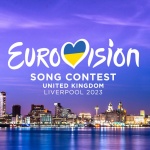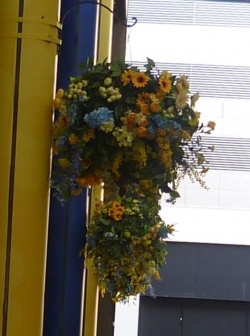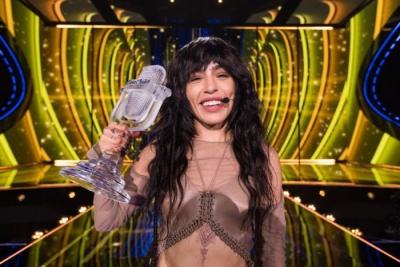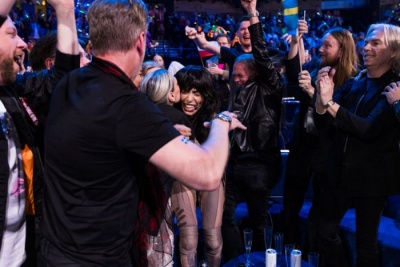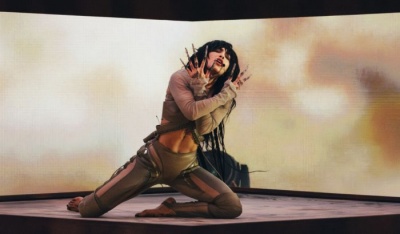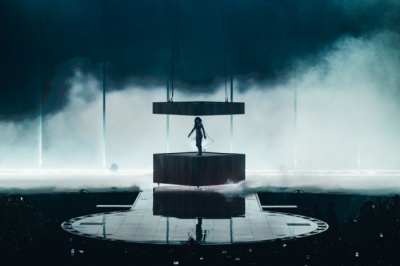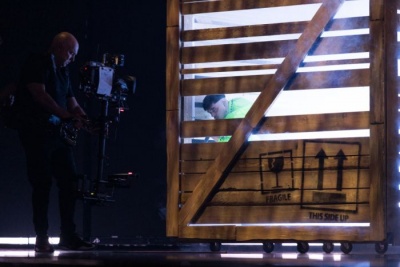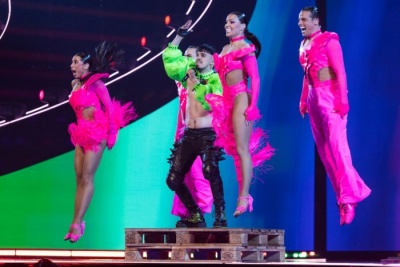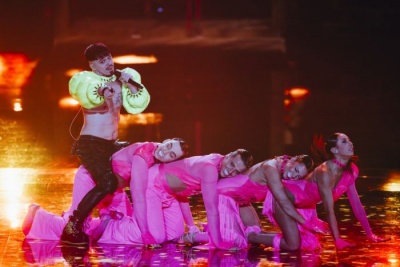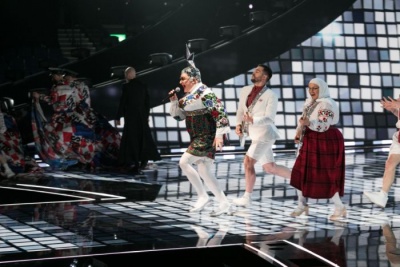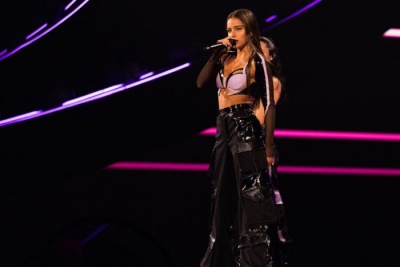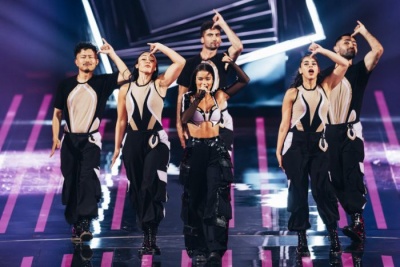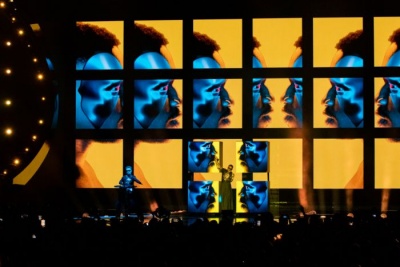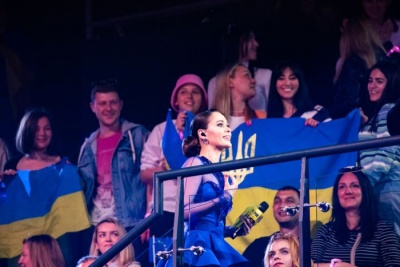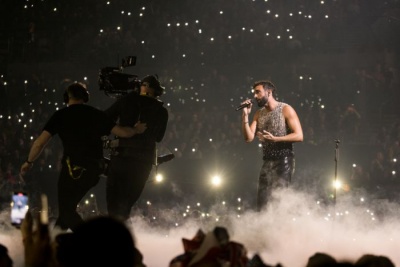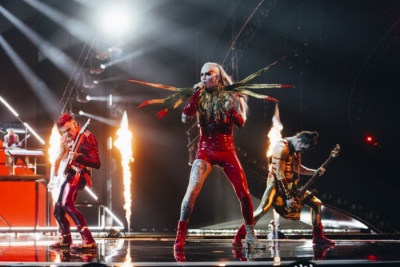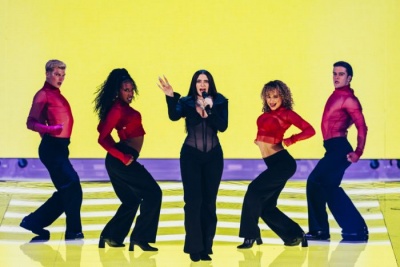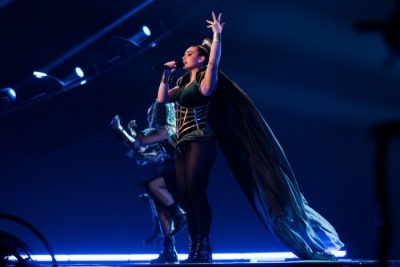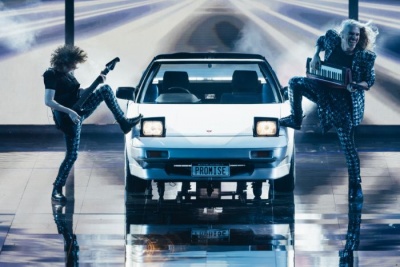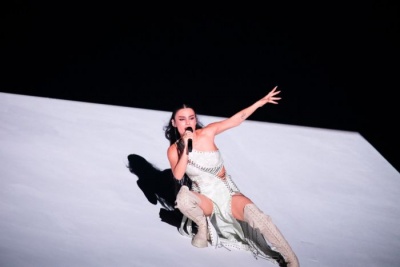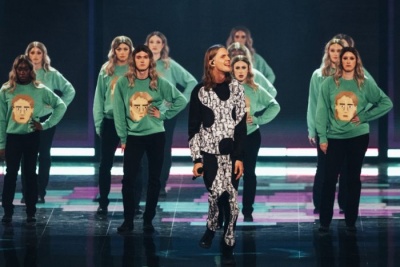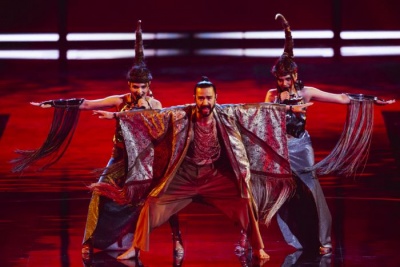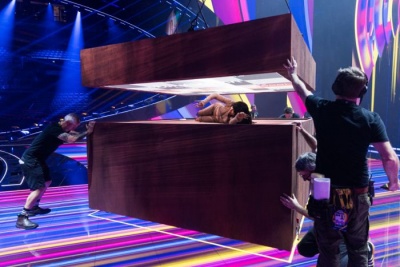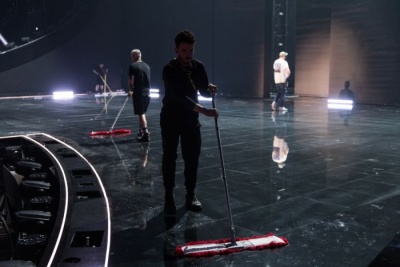Weaver's Week 2023-05-21
Last week | Weaver's Week Index | Next week
While Tvorchi were performing last Saturday night, the invading forces launched two missiles at their hometown, Ternopil. Warehouses were damaged in the attack. It's a shame that the Eurovision Improbability Drive doesn't yet work, because the missile would have been turned into a basket of flowers.
Contents |
Eurovision Song Contest
BBC for EBU, 13-14 May
"Tattoo" received the most votes, and hence won the contest. It's sung by Loreen, representing SVT ("Sweden", in the caption on screen).
Back in 2010, SVT's entry failed to qualify for the Saturday final. "This is my life" was a fragile song, beautiful and uplifting and completely overlooked by the jurors and voters. In the years since, SVT have sent precision-engineered Scandipop, always at a similar tempo, always gently uplifting, always with a similar interchangeable sound. We defy anyone to hum the difference between "If I were sorry" and "I can't go on".
SVT's entries have proven to be jury catnip; only once has their entry failed to trouble the jury top ten. Increasingly, televoters saw through this gimmick, ranking entries towards the middle of the pack.
For this year's contest, SVT got back Loreen, who won the whole contest in 2012 with "Euphoria". Back then, fans said that it was the best Eurovision song in twenty years, since Johnny Logan's wig. This column thought it OK, a perfectly fine winner in a mediocre contest.
Hardcore Eurovision fans don't agree with our doubts. Hardcore Eurovision fans have treated Loreen as the greatest thing since sliced bread, and "Euphoria" as the best song of all 1700 to have performed on the Senior stage. Really? All of them? Even "Dansevise"? Even "Waterloo"? Even "One step further"?
Loreen had tried to reach Eurovision again in 2017, but in spite of masses of hype and love from the fans, "Statements" failed to make the national final. And this sets up a double narrative: Loreen is both a big winner (she's literally won the contest) and has a revenge arc (having been snubbed a few years ago).
So we reach the SVT pre-selection, where Loreen is back. This time, the revenge arc wins out – "Tattoo" wins by a mile, eclipsing 27 other great songs. Same at the Eurovision final. The staging is unusual, Loreen is wheeled on set lying between two lightboxes, one above the other. As the song progresses, she'll push the top box up and up until she stands for the final chorus.
So, why does "Tattoo" leave us cold? In part, it's because Loreen hasn't progressed artistically. This song could have been the Inevitable Second Single she performed at the 2013 contest, the follow-up to "Euphoria" ten years ago. But we could say the same about Johnny Logan, whose two winning songs are almost completely interchangeable.
No, our problem with "Tattoo" is that it's got no soul, it's music built to order. Focus-grouped and workshopped to absolute perfection. All killer and no filler. Completely clinical and sterile, leaves us feeling nothing.
Some have suggested that it's not even original, suggesting that Mika Newton's song "V plenu" uses a similar build and tempo in its pre-chorus. We see the similarity, but then we remember that it's very common for a song to rise in pitch as it heads to a chorus – think of S Club 7's "Reach", how the build makes the chorus even more ecstatic.
While this column didn't see a huge amount of merit in "Tattoo", the professionals did. "Tattoo" won two of the Marcel Bezençon awards, those voted by the commentators and by the press. "Tattoo" received a total of 340 marks from the professionals, over 9 points from each jury. The voting public made it their second favourite song, and first plus second is enough for a win this year.
Brussel sprout energy
"Cha cha cha" was the runaway televote winner, performed by Käärijä for YLE ("Finland"). Friday night, the work week is done, and you're going to go off and get drunk for the sake of getting drunk. After imbibing lots of pina coladas, you might write a song. Or even get the idea that you can do a ballroom dance while six sheets to the wind.
So much energy on this stage! The singer, his backing dancers, the remarkable outfit. Käärijä bursts out of the crate, invites us into his world, he asks us to join him in his drinking spree, to watch him on the floor.
By contrast, "Tattoo" put distance between viewer and performer – first by narrowing the screen to almost nothing, then by literally putting barriers between us – Loreen's nails are long and dangerous and give "do not cross" vibes. While Käärijä is leading a posse, Loreen is dancing on her own. The crowd responded, chanting with the "cha cha cha" refrain.
Käärijä is the big winner of the contest. His entry – for YLE ("Finland" on screen) – won the viewer's vote by a country mile. In percentage terms, it's the second biggest Big Wodge in the history of the Big Wodge, beaten only by the vote for "Stefania" last time.
He's got a hook for everyone to remember him by – Käärijä is the guy who the public liked, didn't win, is there to be avenged. YLE can bask in the glow of being very popular again, and don't have the hassle of organising next year's contest. Or, indeed, paying for it.
There is a clear disconnect between the jury vote and the public vote. The clear public fave was ranked fourth amongst the juries; the clear jury fave was in an approximate tie for second amongst the public. Some of the more loud commentators online screamed blue murder: perhaps this disappointment has eased after a week.
But this year has exposed a clear disconnect between "songs made for professional musicians" and "songs made for the public". And we're not sure there's an easy way to bridge that divide. Or that it's a problem in the first place.
Since 2009, Eurovision has tried to balance the professional and the public opinions. Runaway public winners have to be validated by the juries – as we saw last year, when "Stefania" finished fourth with the juries. Runaway jury winners have to be validated by the public – as we see this year, when "Tattoo" came second with the Europublic. If the public could not stand "Tattoo", it would have scored no marks, and would not have won.
We're comfortable with the juries having half the points, and half the influence. All points are equal, a point from the public is as valuable as a point from your peers. On the other hand, the juries cannot be seen to completely overrule the public all the while, otherwise the public will lose faith in the contest as a contest. "Just ditch the juries!" shout some. We've tried that, juries were not used from 1998 to 2008, and Eurovision became dull and samey and tiresome. Having juries forces broadcasters to think about sending a song with actual vocal quality, not just pyro and exposed flesh.
Eurovision is made by public service broadcasters. Public service broadcasters are there to serve the public. Each Eurovision Song Contest makes a financial loss, it survives on funding from the host city, and more generally on goodwill from the people.
The people want to see the most absurd game show it is our privilege to cover. 200 million people, in Europe and beyond, want to see the biggest annual cultural or sporting event on the planet. Music that's about ten years out of date, or so contemporary that it works. The bizarre clothes, the even more bizarre haircuts, the halting attempts at broken English – and that's just Graham Norton.
What other evening's entertainment will take us from a warzone to an anti-war art piece, via two heavy metal songs, two powerful women, and a meditation on surviving great loss? Eurovision is a symbol of hope. By watching, by participating, we support the performer's right to be themself. To tell their stories, speak out about life and injustice and feeling a way to a better world.
Did somebody say "Unicorn"?
"Unicorn" came third overall – second with the juries, fifth with the televoters, scoring about half of each winner's score. Noa Kirel's performance enhanced the lyric: belief in the ability to change oneself by the metaphor of a mythological and unattainable figure, and through the power of an unexpected dance break. The song ticks all the boxes: great vocals, plenty of show, contemporary and well-performed.
Noa was an internal selection by KAN ("Israel" on screen), and proved an inspired choice. Controversial, too: some of the frothing right-wingers object to her, probably because she's a better singer than them, looks more beautiful than them, can sing and dance better than them. Although only 22, Noa has been on the pop scene for eight years, and has been voted Best Israeli Act at MTV's European awards five times. It's enough for her to be on Got Talent as a judge.
Third place is an outstanding result for KAN. Perhaps it's something for other broadcasters to emulate: enter a song authentic to your culture, an established performer who isn't known overseas, and see what happens. KAN (and its predecessor IBA) manage to get into the top five every few years – not so often to be dominant, not so rarely to have people shouting "WHAT IS HAPPENING?!".
Regrettably, the shine was taken off "Unicorn"'s achievement because of the country designation. Some people cannot see anything labelled "Israel" without thinking of the dispute between that territory and Palestinian people. This column is not a suitable venue to rehearse the arguments. The Eurovision Song Contest is not a suitable venue to rehearse the arguments. Noa Kirel is not a representative of the current government; she can no more solve the problems than we can recover the lost secrets of Greek fire.
The Eurovision Song Contest is a contest for songs, not national labels; let us emphasise and give credit to the song. We suspect that there would be less aggression if the jurors shouted "Twelve points to 'Unicorn'!" rather than "Israel". Deeply regrettable that some online commentators – including people we respect in other fields – chose to let their prejudice blind them from the quality of the song "Unicorn", and the spectacle of Noa Kirel's performance.
Direct qualifiers
Skipping down to sixth place, we find "Heart of steel" from Tvorchi. It represented UA:PBC ("Ukraine"). The guests of honour at Liverpool's party brought their blue-and-yellow light show, and a strong synth-based song. Fourth in the televote, mid-table with the juries, and we can understand both elements. The juries will have given a middling vote because it's a middling song; the public will have voted because they see "Ukraine" on screen and in the news.
"Eurovision is not a political contest" claimed Martin Österdahl, when he rejected a request for Vlodomir Zelensky to address the viewing millions. Martin, mate, you can say this as much as you like, nobody's going to believe you. "Heart of steel" is a song about a political act, the defence of Mariupol steelworks from invading forces. "Mama sc" is a political song, about the futility of war. "My sister's crown" is a political song, with lines "You can take your hands back, no one wants more boys dead". "Watergun", another anti-war song.
We could go on. The exclusion of Russia from the EBU after invading Ukraine; the non-exclusion of Russia from the EBU after invading Georgia in 2008? Both are political decisions. Choosing to emphasise the country name rather than the song name or the broadcaster? Another political decision, with consequences we saw last Saturday. The very existence of the EBU? Political.
Should Vlodomir Zelensky have appeared? It would be most unusual: we don't normally see the president or anyone from the government appear at the contest, and Zelensky's office said they had never asked to appear. Supposing they had, a generic goodwill message would be justified; a message thanking Liverpool would be justified; but perhaps not more. The EBU put itself in difficult position where there is no easy answer, and that's the most political thing of all.
Onwards, and let's see if we can move on a bit. "Due vite" was the best performer amongst the automatic qualifiers. Marco Mengoni sung for RAI ("Italy"). He surprised us with just how passionate he sounded, how he managed to wring every emotion out of the song, and how he's performing from the Eurovision Trampoline Championships. Third place amongst the juries, sixth in the televote. "Due vite" won the Marcel Bezençon award voted by this year's composers.
We had high hopes for "Évidemment", and La Zarra didn't disappoint. The representative of France Télévisions ("France") sung while perched high on a wedding cake, literally lifting herself above the hoi polloi. The traditional chanson elements merged with modern electronica, it's a song timeless and anchored to the present day. A poor position in the draw hurt the song's chances, and it finished with a respectable smattering of votes and 16th overall.
Once upon a time, they revealed the Big Wodge of public votes in order of Wodginess. This year's smallest Big Wodge went to "Eaea", Blanca Paloma's entry for TVE ("Spain"). Fascinating performance, starting with Blanca walking through a mesh doughnut, then dancing with and against her supporting team. Another meld of traditional elements – flamenco music with a modern twist. The juries absolutely loved it, putting the performance ninth. Phone voters thought, "too difficult" and left it stone last. This column's with the phone voters: the song never delivers on its early promise, and seems to get harder as it goes on. Maybe we needed to open the booze before song 9.
"Blood & glitter" from Lord of the Lost (ARD via NDR, "Germany") propped up the scoreboard, as we feared. The thrash metal band came on with bags of energy and some of the most outlandish costumes of the year; the lead singer's in a spandex catsuit with one leg missing. The song had a memorable chorus, but the verses were screamed and shouted. While the energy connected with a few viewers at home, juries found their excuse to mark this song right down.
"I wrote a song" came second last for host broadcaster BBC ("United Kingdom" on screen). This is a shame, because it's a contemporary and sassy song. The staging was interesting, they channelled a Punch and Judy for the first verse with everyone up on a narrow horizontal catwalk. But the juries found it bland and forgettable, the viewers found it bland and forgettable, and votes clustered in 20th place when Eurovision only awards marks for the top ten.
The BBC put on a tremendous show this year. Perhaps they could have had a snidge more Ukranian involvement in the Saturday final, perhaps they didn't need Graham Norton as a host because Hannah Waddingham could have done the voting alone. Saturday's interval acts were a medley of Liverpool songs by Eurovision faves (highlights: Netta's "You spin me round (like a record)", and Daði Freyr's "Whole again") and Sam Ryder's new song with Roger Taylor from Queen.
We were also impressed with how the BBC dealt with the Wrong Sort of Shiny. For about twenty years, there's been a problem with strobe lighting on Eurovision performances. Too much strobe lighting too quickly can induce epileptic seizures and be quite difficult for other people to watch. The BBC, as a responsible broadcaster, wants to minimise this Wrong Sort of Shiny – they usually do it by decreasing the contrast between light and dark, or by fading the edges of the picture. Few other broadcasters in Europe take this sort of care.
For this year's contest, it appears that delegations were allowed to use however much Shiny they wanted during their performances. Bits controlled by the BBC – the opening, closing, and interval acts – were altered to reduce the Shiny. We saw this most clearly during the Junior Eurovision segment, where performances were altered visually. It's a fair compromise, and far better than the ultra-aggressive flashing we got from RAI last year.
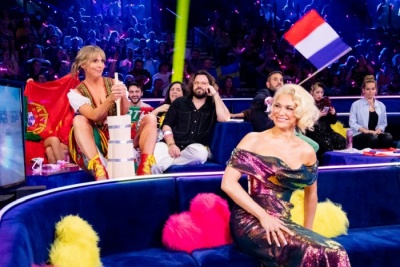 BBC commentator Mel Giedroyc gets her moment in the limelight, much to Hannah Waddingham's amusement, and the RTP delegation's bemusement (CH).
BBC commentator Mel Giedroyc gets her moment in the limelight, much to Hannah Waddingham's amusement, and the RTP delegation's bemusement (CH).
Rest of the high scorers
"Queen of kings" finished fifth for Alessandra (NRK "Norway"). It's the one with the warrior queen calling her troops to battle, in the style of Game of the Rings or Lord of Thrones or whatever this week's big fantasy series is. Most juries gave it something, most televoters gave it more. The build in this song has been bugging us for months, the driving rhythm and dah-dah-dah-DAAH motif was familiar from somewhere but we couldn't place where. Michael Buble's "Cry me a river", that's the dramatic comparison.
Four other jury faves complete the top ten. "Because of you" for Gustaph (VRT "Belgium"), the guy in the white hat with a light gospel song. "Bridges" by Ailka (EER "Estonia"), the one with the self-playing piano was a superb power ballad in the style of "Arcade". "Promise" from Voyager (SBS "Australia"), a rock-tastic song with keytars and optimism in equal measure.
Just nine points separated 10th from 15th. "My sister's crown", Vesna (CT, "Czechia" on screen) came tenth. They wear pink, they sing in favour of strong women and against war; we fear that the public lost interest after "Cha cha cha" immediately before them. "Stay" from Monika Linktyé (LT, "Lithuania") explained how Monika finds her peace, and invited us to join her in that calm state – exactly what we needed between the massive energy "Blood & glitter" and "Unicorn".
"Break a broken heart" Andrew Lambrou (CyBC, "Cyprus"), another sensitive ballad with equal respect from jurors and televoters. The public were behind "Mama ŠČ" by Let3 (HRT, "Croatia"), an art-punk song with lyrics "Mommy kissed the moron" and "Alligator psycopath". The public might not have understood the lyric, we sure as anything got the meaning.
It's an achievement to qualify for Saturday. And you beat the hosts.
"Future lover" from Brunette finished fourteenth for AMPTV ("Armenia"). It's a bait-and-switch song, starts like a power ballad, then jerks into a powerful electroclash noise. The visuals also change, from Brunette sitting on a ramp in pink lights, to Brunette sitting on a ramp in distracting shadow patterns. The producers could have gone to town with these special effects, but chose to restrain themselves; such sparing effects added to the song.
AMPTV are on a really hot streak at the moment – "Snap" was the song of the year last year, they won Junior Eurovision eighteen months back, and put on a wonderful show last December. Even before the pandemic, the broadcaster selected songs with depth and meaning – sometimes as political as "Face the shadow", sometimes as apparently superficial as the one by Aram MP3. Like their colleagues at Georgia Public Broadcasting, AMPTV get the brief at Junior Eurovision; unlike GPB, AMPTV know their way around Senior.
On the surface, "Future lover" is an ode to Brunette's next lover, inspired by snippets of posts on Tumblr and lashings of vanilla extract. Just below the surface, it's a song referencing her history with panic attacks and disturbed thinking. It's a tough song to watch, it's an even more tough song to write and perform. No such problem for "Who the hell is Edgar?" (Teya and Salena, ÖRF "Austria") about art in a late-capitalist society, and being inhabited by the ghost of a teletubby.
Seven songs remain to summarise, they all finished in the bottom bit of the scoreboard. "Ai coração" by Mimicat (RTP "Portugal") was a flamenco-inspired clap-and-stomper, an effort to prove that song number 2 is not a death slot. Another upbeat song, "Solo" from Blanka (TVP "Poland") was big in eastern Europe last Christmas, but that didn't translate into many televotes.
"Watergun" by Remo Forrer (SRG SSR "Switzerland") was the one where people sway and reach while a young man sings about how he doesn't want to be a soldier. Not subtle, effective enough to reach the final. So was "Samo mi se spava" (Luke Black for RTS "Serbia"), somewhere in the Muse – Hatari hard rock – performance art space. Softer and more accessible rock from RTVSLO ("Slovenia")'s Joker Out, "Carpe diem" was commercial and accessible in the Franz Ferdinand style, but got overshadowed by "Unicorn" and "Mama ŠČ" around it.
Two ethnic songs end our recap: "Soarele si luna" from Pasha Parfeni (TVM "Moldova") had flute solos, big drums, and crazy hairstyles; a bit less memeable than TVM's regular fare. "Duje" from Albina & Familja Kelmedi had the impossible task of following "Tattoo"; the entry from RTSH ("Albania") deserved better, a percussive and whirling folk-pop song with lots of Albanian imagery.
Other matters
A correspondent asks why the Eurovision Song Contest starts and finishes so late. The show runs from 8pm to (roughly) 12.15am London time; it was a midnight start in Baku some years ago. Historically, the contest started even later – most 1960s shows, for example, began at 9pm, and 1974's contest in Brighton didn't start until 9.30. The 8pm start time wasn't instituted until 1980, and the show was complete by 10.30.
Even in the early televote era, the contest didn't run much past 11pm. The recent extensions past midnight started with ÖRF's prolix show in 2015, which simply needed a better editor. 2016 saw a longer voting window, extended from 20 minutes to almost an hour; longer and more complex interval acts, and the Big Wodge voting gimmick, means the show regularly runs over 4 hours. This year's show ran 11 minutes over the scheduled time, finishing at 12.13am in Liverpool (1.13am in Frankfurt, 4.13am in Baku).
But why don't they start it an hour earlier, at 7? Tagesschau is an absolute institution, the fifteen minute news bulletin to inform all German speakers of the day's events. They don't move it lightly, and there isn't really the desire to move Eurovision any earlier. The contest fills an evening very cheaply, it delivers huge ratings, and fits around people coming back from a night out.
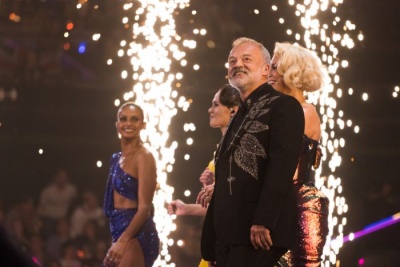 Pyro curtain for our hosts: Alesha Dixon, Julia Sanina, Graham Norton, (obscured) Hannah Waddingham (CC).
Pyro curtain for our hosts: Alesha Dixon, Julia Sanina, Graham Norton, (obscured) Hannah Waddingham (CC).
The semi-finals weren't close. On Tuesday, the top nine were miles clear, "Samo mi se spava" clinched tenth by three points from "Aija" by Sudden Lights. "We are one" finished 12th, but scored just 10 points, as the bottom four songs were ignored across the board. A huge gap on Thursday between "Bridges" in 10th and "Power" in 11th; entries from TVR ("Romania") and SMRTV ("San Marino") failed to pick up a single point between them.
Eurovision songs rule the pop charts this weekend. The top five downloads are all from the contest (in order: Sam Ryder's interval act "Mountain", "Tattoo", "I wrote a song", "Queen of kings", "Cha cha cha"), with another 16 lower down the top 50. "Tattoo" and "Cha cha cha" the most streamed songs, each contributing 0.0025 new pence to split between the performers and songwriters.
Next year? SVT have confirmed that they'll host next year's competition. Götenborg has almost ruled itself out, Malmö may be too small. Stockholm is the prohibitive favourite. This column's cheering for Örnsköldsvik, halfway up the Gulf of Bothnia, a paper-and-wood exporting port with a large ice hockey arena. For the date, we reckon 14, 16, and 18 May – this clears any clash with the various UEFA football contests. Wherever and whenever the contest is held, we look forward to it.
Let's finish with a final round to this year's hosts. The BBC were like a bride who has been planning her wedding all her life. They've had 25 years to prepare, and didn't want anything to go wrong. Nothing went wrong, it was an action-packed and fun week throughout. Even the Extended Voting Window didn't drag too much.
The BBC came, the BBC saw, the BBC conquered. Well done to everyone involved, from the head of delegation to whichever backstage runner made sure to feed and groom Marty Whelan's wig. A fine and fabulous job was done by everyone.
In other news
We're adding KVF to our memory banks. The broadcaster for the Faroe Islands has applied for membership of the EBU. Membership will give KVF access to the news and sport exchanges, and let them enter the Eurovision Song Contests. What is Tørshaven like at this time of year, and do the sheep mind sharing their field with a trouser press for a weekend?
KVF won't be able to enter Eurovision Choir of the Year; this year's edition has been cancelled on the grounds that not enough broadcasters wished to take part. Choir of the Year was held in 2017 and 2019 as part of the European Choir Games; a planned 2021 edition was scuppered by the pandemic. It's a shame, because Cordydd (S4C's putative entry) would have been the choir to beat.
BAFTA Television Awards were handed out on Sunday night. Claudia Winkleman won Best Entertainment Performance for The Traitors, the show took Best Reality & Constructed Factual. The Masked Singer took home Best Entertainment Programme.
Ant and Dec are to take a break from Saturday Night Takeaway after the next series. The revival has been a spring fixture since 2013, and because each show has a similar feel, it's comfortable and entertaining television.
Stanley Appel has died. The television producer was best known for making Top of the Pops on and off between 1975 and 1994. In the shows we call game, he made Every Second Counts with Paul Daniels, Fast Friends and Blankety Blank with Les Dawson, series starring Roland Rat and Orville the Duck, and many many many more. Remembered as a gentle perfectionist, with rarely a cross word, Stanley Appel would have been 90 next month.
At the second time of asking, Durham's University Challenge team accounted for Royal Holloway, winning the semi-final by 160-90. Popular science books, mass spectrometry, Vereneses' paintings, all were grist to the Durham mill. About the only thing they didn't know about was cows in film. Royal Holloway didn't have a good night: beaten to the buzzer very often, and one pointless bonus sequence went "Lully", "Lully", and a question where the answer was Lully. An unfortunate end to a tremendous performance.
New this week, Sewing Bee (BBC1, Wed) with another set of stitchers. You'll get the hang of The Great Auction Showdown with Paul Martin (C5, weekdays).
Last in the "present" series of Hell's Kitchen (ITV2, Wed), Gordon Ramsay's Future Food Stars (BBC1, Thu), and The Big Interiors Battle (C4, Fri).
Pictures: Outdoor pictures of Liverpool by Weaver. Show pictures credits: (CC) EBU / Corinne Cumming; (SLB) EBU / Sarah Louise Bennet (CH) EBU / Chloe Hashemi
To have Weaver's Week emailed to you on publication day, receive our exclusive TV roundup of the game shows in the week ahead, and chat to other ukgameshows.com readers, sign up to our Google Group.

